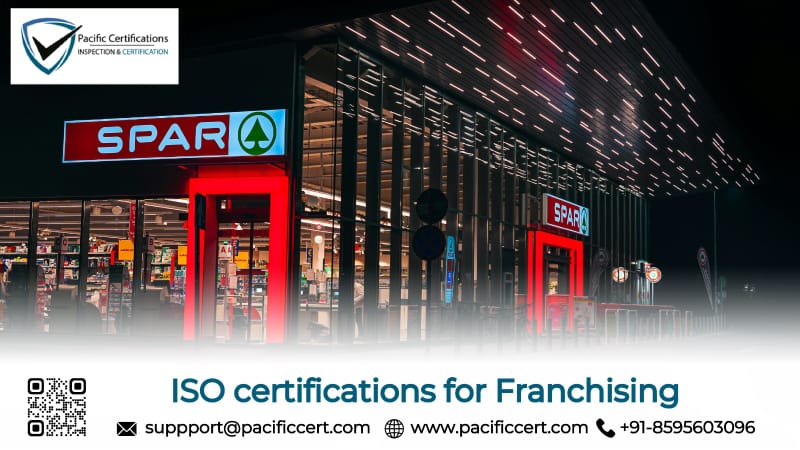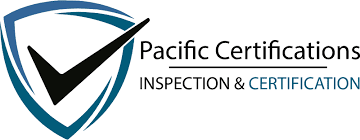ISO Certifications for Franchising Businesses, Requirements and Benefits

Introduction
Franchising businesses operate multi-unit networks spanning diverse geographic locations, managing brand consistency, franchisee onboarding and training, quality standardization across outlets, supply chain coordination, and compliance monitoring systems ensuring uniform service delivery. These organizations face critical operational challenges including inconsistent execution across franchise locations, quality control variations from franchisee interpretations of operational standards, legal compliance complexities navigating Federal Trade Commission regulations and state-specific franchise laws, reputational risks from individual franchisee failures affecting brand perception, and operational disruptions from supply chain failures or franchisee turnover.
ISO certifications provide franchising businesses with internationally recognized frameworks to systematically manage quality standardization, environmental responsibility, occupational safety, information security, and risk mitigation across franchise networks while demonstrating compliance with FTC Franchise Rule requirements and state registration laws. Franchisors must navigate complex regulatory landscapes including FTC disclosure document requirements, compliance with North American Securities Administrators Association guidelines in 15 registration states, franchise agreement standardization, and ongoing monitoring obligations ensuring franchisee adherence to brand standards and legal requirements.
Consistent brand experience across every location defines franchising success and customer loyalty
Quick Summary
ISO certifications provide franchising businesses with internationally recognized frameworks to manage quality standardization through ISO 9001, environmental responsibility through ISO 14001, occupational safety through ISO 45001, information security through ISO/IEC 27001, business continuity through ISO 22301, risk management through ISO 31000, and energy efficiency through ISO 50001.
For more information on how we can assist your franchising business with ISO certifications, contact us at [email protected].
Applicable ISO Standards for Franchising Businesses
Below are the most relevant ISO standards applicable to multi-unit franchise systems, franchisor headquarters, master franchisees, and area development operators:
ISO 9001:2015 - Quality Management System
ISO 9001 establishes standardized operational procedures, service quality benchmarks, franchisee training frameworks, and customer satisfaction measurement systems ensuring consistent brand experience across all franchise locations regardless of individual franchisee ownership, reducing quality variations and customer complaints.
ISO 14001:2015 - Environmental Management System
ISO 14001 manages environmental impacts across franchise locations including waste generation from packaging and operations, energy consumption from HVAC and lighting systems, water usage optimization, and sustainable sourcing practices demonstrating corporate environmental responsibility to increasingly eco-conscious consumers.
ISO 45001:2018 - Occupational Health and Safety Management System
ISO 45001 addresses workplace safety hazards unique to franchise operations including slip and fall risks in retail environments, kitchen safety in food service franchises, employee training gaps from high turnover rates, and contractor management during renovations ensuring consistent safety standards across the franchise network.
ISO/IEC 27001:2022 - Information Security Management System
ISO 27001 protects sensitive information including franchisee financial data, customer databases, proprietary operational manuals, point-of-sale systems, and digital ordering platforms against cyber threats, data breaches, and unauthorized access critical for maintaining franchisor-franchisee trust and regulatory compliance.
ISO 22301:2019 – Business Continuity Management Systems
ISO 22301 prepares franchise networks for operational disruptions including supply chain failures affecting multiple locations, franchisor headquarters system outages, regional natural disasters impacting clusters of outlets, and crisis events requiring coordinated network-wide response ensuring business continuity.
ISO 31000:2018 - Risk Management
ISO 31000 provides systematic approaches for identifying and mitigating franchising-specific risks including franchisee financial instability, brand reputation damage from individual location failures, legal compliance violations, quality control lapses, and competitive market pressures affecting franchise viability.
Click here to find out more applicable standards to your industry
What are the Requirements of ISO Certifications for Franchising Businesses?
Franchising businesses seeking ISO certification must establish and maintain documented policies, procedures, and records aligned with the selected ISO standards. Key requirements include the following:
ISO 9001:2015 – Quality Management System
Define quality objectives for franchise network including service delivery standards, product consistency benchmarks, customer satisfaction targets, and operational performance metrics
Establish documented franchise operations manuals detailing standard operating procedures, service protocols, brand guidelines, and quality control checkpoints applicable across all locations
Implement franchisee training programs covering operational procedures, quality standards, brand requirements, customer service expectations, and performance evaluation criteria
Conduct regular franchise audits assessing compliance with operational standards, brand guideline adherence, quality control implementation, and customer experience consistency
Maintain performance monitoring systems tracking individual franchise location metrics, customer feedback scores, mystery shopper results, and quality deviation reports
Document corrective action procedures addressing franchisee non-compliance, quality failures, customer complaints, and continuous improvement initiatives across the network
ISO 45001:2018 – Occupational Health and Safety Management System
Identify franchise-specific safety hazards including retail environment risks, food preparation hazards, equipment operation dangers, customer interaction risks, and facility maintenance safety
Establish documented safety policies applicable to franchise network addressing employee training requirements, personal protective equipment standards, incident reporting protocols, and emergency response procedures
Implement franchisee safety training programs covering hazard identification, safe work practices, emergency evacuation procedures, first aid protocols, and regulatory compliance requirements
Conduct workplace safety inspections at franchise locations assessing hazard controls, equipment maintenance, safety signage, employee compliance, and emergency preparedness
Maintain incident tracking systems documenting workplace injuries, near-miss events, safety violations, corrective actions, and safety performance trends across franchise network
Document safety communication protocols ensuring consistent dissemination of safety updates, regulatory changes, incident alerts, and best practices to all franchisees
ISO/IEC 27001:2022 – Information Security Management System
Conduct information security risk assessments identifying threats to franchisee financial data, customer information, proprietary operational systems, point-of-sale platforms, and corporate databases
Establish access control policies defining user permissions for franchise management systems, restricting sensitive information access, implementing multi-factor authentication, and managing franchisee system credentials
Implement data protection procedures for customer payment information, franchisee business records, operational trade secrets, employee personal data, and compliance with data protection regulations
Monitor cybersecurity threats through network security systems, regular vulnerability assessments, security incident logging, and franchisee cybersecurity training programs
Maintain backup procedures ensuring franchisee data recovery, system restoration capabilities, business continuity following cyber incidents, and minimal operational disruption
ISO 22301:2019 – Business Continuity Management System
Conduct business impact analysis quantifying financial losses from franchisor system failures, supply chain disruptions affecting multiple locations, regional disasters, and brand reputation crises
Establish documented recovery strategies including backup supplier networks, alternative distribution channels, emergency communication protocols, and crisis management teams
Implement incident response plans addressing franchisor headquarters failures, supply chain interruptions, multi-location disasters, franchisee business failures, and coordinated network responses
Develop communication protocols for franchisee notification during disruptions, customer communication management, media relations, and stakeholder updates during crisis events
Conduct business continuity exercises simulating supply chain failures, system outages, regional emergencies, and testing franchisee response coordination
ISO 31000:2018 – Risk Management Framework
Establish risk governance structures defining risk appetite for franchisee financial stability, brand reputation protection, legal compliance, operational quality, and competitive positioning
Conduct regular risk assessments evaluating franchisee creditworthiness, market saturation risks, competitive threats, regulatory compliance gaps, and operational performance variations
Implement franchisee screening procedures including financial due diligence, background verification, capability assessment, and ongoing performance monitoring systems
Monitor franchise network risks through performance dashboards, financial health indicators, compliance audit results, customer satisfaction trends, and competitive market analysis
Maintain risk registers documenting identified risks across franchise network, likelihood assessments, impact evaluations, mitigation strategies, and residual risk monitoring
Tip:Begin ISO implementation by establishing ISO 9001 quality management systems standardizing franchise operations manuals and training programs, then progress to ISO 45001 for safety standardization and ISO 27001 for franchisee data protection, allowing systematic implementation while building franchisee engagement and demonstrating measurable brand consistency improvements.
For more information on how we can assist your franchising business with ISO certifications, contact us at [email protected].
What are the Benefits of ISO Certifications for Franchising Businesses?
ISO certifications are suitable for multi-unit franchise systems, franchisor headquarters organizations, master franchise operators, and area development franchisees.
Improved brand consistency reducing operational variations across franchise locations, ensuring uniform customer experiences, and minimizing quality-related customer complaints
Stronger franchisee compliance demonstrating commitment to standardized operations, simplified training and audit processes, and enhanced accountability across franchise network
Better operational efficiency streamlining franchise operations manuals, reducing training time for new franchisees, and optimizing resource allocation across network locations
Higher franchisee confidence attracting quality franchisee candidates seeking established operational frameworks, reducing franchisee failure rates, and improving network stability
Enhanced competitive advantage differentiating franchise opportunities in crowded markets, supporting premium franchise fee justification, and attracting corporate and international expansion opportunities
Greater legal protection demonstrating documented compliance with FTC requirements, supporting defense against franchisee disputes, and reducing regulatory violation risks
Reduced operational risks through systematic franchisee monitoring, early identification of quality deviations, and proactive intervention preventing brand reputation damage
Streamlined expansion capabilities accelerating new franchisee onboarding, simplifying international market entry, and facilitating master franchise licensing with documented systems
Increased investor confidence supporting franchise system valuations, attracting private equity investment, and enabling capital raising for network expansion
Better franchisee retention through transparent operational support, documented training resources, and demonstrated franchisor commitment to network success
The global franchise market is projected to exceed USD 369 billion in the coming years with a compound annual growth rate of 9.73%, driven by entrepreneurial adoption of proven business models, international expansion opportunities, and technology-enabled franchise management platforms. Regulatory frameworks are tightening globally including enhanced FTC disclosure requirements, state-level franchise relationship laws, international franchising regulations, and increasing scrutiny of franchisee-franchisor relationship fairness elevating compliance pressures.
ISO certification adoption demonstrates 20-30% reductions in franchisee operational failures, measurable improvements in brand consistency scores, and enhanced franchisee satisfaction rates among certified franchise systems. ISO 9001 and ISO 45001 certifications are becoming baseline requirements for international franchise expansion, corporate franchise acquisitions, and franchise financing arrangements, while increasing franchisee expectations for operational support and growing legal scrutiny drive investments toward documented management systems demonstrating systematic franchisee support.
How Pacific Certifications Can Help?
Pacific Certifications, accredited by ABIS, acts as an independent certification body for franchising businesses by conducting impartial audits against applicable ISO standards. Our role is to objectively assess whether documented management systems and franchise operational practices conform to international ISO requirements, based strictly on verifiable evidence and operational records.
We support franchising providers through:
Independent certification audits conducted in accordance with ISO/IEC 17021 for management system standards
Practical assessment of real franchise operations, quality standardization systems, franchisee training programs, and network management controls
Clear audit reporting reflecting conformity status, non-conformance findings, and certification decisions based on documented evidence
Internationally recognized ISO certification upon successful compliance demonstration
Surveillance and recertification audits to maintain certification validity throughout the three-year certification cycle
Contact us
If you need support with ISO certification for your franchising business, contact us at [email protected] or +91-8595603096.
Author: Ashish
Read more: Pacific Blogs

